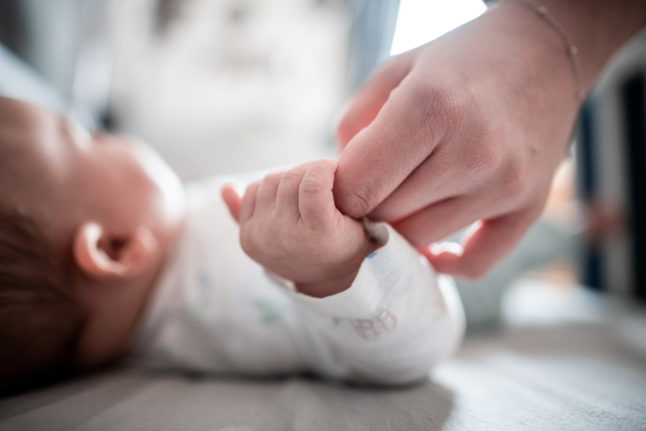Sitting on her great-grandmother’s knee, the youngest of the Queen’s descendants beamed a gummy grin in the official portrait released to mark the monarch’s 90th birthday.
Princess Charlotte, the youngest Windsor at two weeks shy of her first birthday, was dressed immaculately in a retro-style floral pattern smock and bloomers by Spanish brand M&H.
“We were surprised but very very proud,” Margarita Pato, the woman behind the boutique brand told The Local on Friday.
“Not only did she look absolutely beautiful in the portrait by Annie Leibovitz but for our outfit to be chosen for such an historic photo is a real honour.”
In fact, it was the second time that the youngest child of the Duke and Duchess of Cambridge has been photographed in an M&H dress.
The infant was photographed in a very similar outfit for a set of portraits taken at Kensington Palace last October, when the dress was again teamed with a pale pink cardigan and tights.

Princess Charlotte photographed in an M&H dress last November. Photo: Kensington Palace
So how did Kate come to discover a small family run boutique brand of children’s clothing that only has outlets in Spain?
“We haven’t had any contact with the family but we think that they discovered our clothes through their nanny, who is Spanish, and who may have bought items here and taken them back for her charge,” explained Pato over the phone from Bilbao.
M&H is a brand that only began trading six years ago. Run by Margarita and her son and daughter, the family from Bilbao opened their first boutique in Valladolid before expanding to five branches in cities across Spain.
“Since the princess was first photographed in one of our outfits we have had enormous interest from abroad,” said Pato. “The princess effect has brought in a lot of calls from the UK and America.”
The firm is working on a website that will hopefully be up and running next month so they can more easily facilitate international sales.

Both dresses worn by Princess Charlotte have now sold out. Photo: M&H
M&H isn’t the only Spanish brand that has benefited from the free publicity. Prince George has twice been photographed in knitwear by Spanish childrenswear designer Fina Ejerique.
Both the cardigan he is wearing in the Queen’s birthday portrait and the jumper sported in the family Christmas card last year, teamed with the shorts, socks and Start-Rite sandals, were Fina Ejerique designs.
But what is it about the Spanish brands that is winning over the Duchess of Cambridge?
“The Spanish are very traditional when it comes to dressing their babies and their children,” explained Pato. “They tend to choose good quality garments in very traditional cuts that are inspired by classic British style. The clothes we make are very like the clothes we were dressed in as children decades ago.
“We update the look using contemporary patterns but maintain the classic style and bring the price tag very much into the 21st century. Our philosophy is not to have an outfit with a price tag over €30,” she said.
The dresses worn by Princess Charlotte were both from the 2015 Autumn / Winter collection and had a price tag of €29.95.
“It’s an amazing thing for us and for the reputation of Spain to be worn by the young royals,” Pato concluded.



 Please whitelist us to continue reading.
Please whitelist us to continue reading.
Member comments